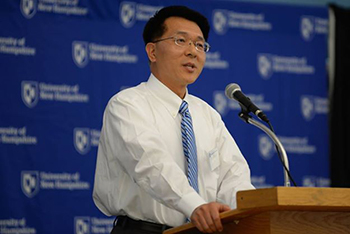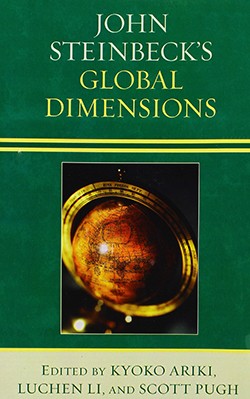
About 750 UNH students study abroad each year. The university hopes to double that number by 2020.
As you read this, hundreds of UNH students are studying abroad in places like Italy, China, France, Ireland and Australia. Five years from now, twice as many will be doing the same. That’s because UNH is making a big push to double the number of undergraduate students who study abroad by 2020.
UNH Today sat down with associate provost for international programs Luchen Li to find out more.
UNH Today: Why should UNH students study abroad?
Li: The benefit of study abroad in terms of students’ career and professional development is profound. The world is now a globalized society. Industries are multinational, transnational. They are looking for talent who are not only trained in their degree subjects but who are also globally mobile and savvy in their respective disciplines, who know the leading technology and who understand what’s happening in their particular sector. Research shows that businesses value cross-cultural communication skills and the ability to work in diverse, multi-cultural teams, and they look to study abroad as evidence of this ability. So international education experiences are very useful for landing that initial job as well as career momentum.
UNH Today: Why does UNH want more students to study abroad?
Li: At UNH we say that education is more than a matter of degree. One of the ways international education can contribute to the “more than” is to enhance our students’ global horizons. So, beyond learning in the classroom — subjects, disciplines, projects — part of our responsibility is to help students broaden their capability to understand the world.Students today have a phenomenal curiosity about the world, and we need to satisfy that curiosity. That’s what college is all about.
Also, our push to increase the number of UNH students who study abroad is in line with a national campaign led by the IIE (Institute of International Education), which is affiliated with the U.S. government and collaborates with foreign governments and industries to generate scholarship funding pathways for students’ mobility. IIE is trying to double the number of U.S. students who study abroad by engaging nearly 600 universities. That’s a major national campaign.
UNH Today: Why does the federal government want to see more students study abroad?
Li: Global competitiveness. Foreign governments all over the world are growing their national talent by sending students abroad. In the U.S. there’s a national interest in getting American students more connected to and engaged in their world. You’ve probably heard President Obama, Secretary of State John Kerry and former Secretary of State Hillary Clinton talk about initiatives to increase the number of American students studying abroad. The U.S. Department of State announced in March the creation of a new branch under its Bureau of Educational and Cultural Affairs — the study abroad office.
 |
|
UNH associate provost for international programs Luchen Li |
UNH Today: What are some real or perceived barriers to studying abroad?
Li: International education requires a student to step outside his or her comfort zone, and that can be scary for some. But college is a time when we challenge ourselves, and study abroad is a perfect break out of our comfort zones. That’s why we encourage students to live and learn abroad.
UNH Today: Are there any other barriers?
Li: Some students worry about whether the courses they take overseas will count towards their graduation requirements. With advice and planning, they usually do, so in most cases students need not worry about study abroad delaying their graduation date.
Other students assume that it will cost them a lot to study abroad.
UNH Today: Does it cost more?
Li: Not necessarily. It depends how you plan it. Almost half of the UNH students who study abroad do so through one of our managed programs, in which they pay the same UNH tuition and fees but study in places like London or Budapest.
Other students study abroad through one of our student-to-student exchange programs with partner institutions. With this type of exchange, our students pay their usual UNH tuition and the foreign students pay their tuition — there’s no financial transaction, but academically they take courses at different universities and their credits transfer back. In many cases, the only additional charge is airfare. And we have scholarships to help cover that.
We are building more of these exchange partnerships so more students can study abroad without an additional charge. In fact, just last week we implemented a summer exchange with Tongji University in China. Two UNH students have already applied to this program.
UNH Today: How does study abroad impact a student’s financial aid package, if at all?
Li: Any student who studies abroad on a UNH program maintains access to their full financial aid package. In fact, that package can be adjusted to factor in additional costs such as airfare. Also, there are a variety of scholarships that students can apply for.
UNH Today: How many UNH students study abroad?
Li: Currently 750 UNH students study abroad throughout the year through a variety of models — approved, managed and exchange programs. (That number does not include students who go abroad to conduct undergraduate research or as part of their work with student organizations, such as Engineers Without Borders. With those, it’s about 850.) As an institution, our goal is to double the 750 number. My personal hope is that we more than double it. But we need to make the baby steps first.
UNH Today: Give us an example of something UNH is doing to get students thinking more about study abroad.
Li: Study abroad requires preparation, and getting a passport is part of that. The College of Liberal Arts inserts a passport application into the folder handed out to incoming freshmen and their families at open houses. Dean Kirkpatrick makes it very clear: Families, if you want to give your graduating (high school) students the best gift, give them a passport. Getting this step out of the way helps students feel more prepared to study abroad. This simple practice is one I hope to see every UNH college emulate.
UNH Today: Did you study abroad?
Li: I went to college in my native China, but I always wanted to study overseas, so I came to the U.S. after college and got my Ph.D. at the University of Oregon.
|
|
Steinbeck Scholar Luchen Li received a Ph.D. in modern American literature and English. In addition to his duties as associate provost for international programs at the University of New Hampshire, since 2013 he has served as president of the International Society of Steinbeck Scholars. “I’m a John Steinbeck fan,” says Li, who has authored several books on Steinbeck. “Through his writing, I have learned a lot culturally, academically, intellectually and even scientifically.” |

















































